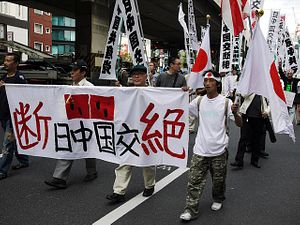Japan, China and South Korea have made moves to improve regional relations recently (albeit to differing degrees) through a mixture of public statements and promises to engage each other in upcoming international forums. Japan is the crux of this, as China and South Korea still have territorial and imperial issues with Tokyo to resolve before substantial reconciliation can get underway. For now however, the three countries appear willing to put aside their nationalist spats to address trade and investment concerns, which have grown increasingly worrisome since Prime Minister Shinzo Abe took office in December 2012.
Three separate events highlight this trend in warming ties. While South Korean President Park Geun-hye still maintains she will not meet with Abe until Japan apologizes for the use of “comfort women” during the Second World War, she has agreed to meet former Prime Minister Yoshiro Mori this Friday, who will bring a letter from Abe. The two sides will also hold their first “strategic dialogue” between the vice ministers of foreign affairs since Park took office in February 2013. This follows the now rare meeting of their foreign ministers, which occurred on the sidelines of an ASEAN forum in Myanmar in August.
During Abe’s attendance at the upcoming U.N. climate summit in New York on September 22, The Asahi Shimbun reported that he will again be working to pave the way for a meeting with Chinese President Xi Jinping. Foreign Minister Fumio Kishida will also be in attendance, and he is expected to hold sideline talks with his Chinese counterpart to facilitate a meeting between the two heads of state at the upcoming APEC summit in November hosted by Beijing. Kishida is also expected to speak with South Korean Foreign Minister Yun Byung-se at the summit.
Additionally, the finance minister and central bank governors of the three countries will be talking this Friday in Cairns, Australia, ahead of a larger G20 meeting with their group counterparts over the weekend. The main topic during their trilateral is expected to be China’s new Asian Infrastructure Investment Bank, seen as a competitor to the Japanese-led Asian Development Bank. According to the Jiji Press, the Japanese side also hopes the talks will improve overall ties.
Indeed, all three sides have reason to worry about how the deteriorating relationship relative to Japan has affected their economies. South Korean businesses have complained about a drop in Japanese tourists, while China may have seen a more systemic decline in its economic relationship with Japan.
Since their dispute over the Senkaku/Diaoyu Islands began in August 2012, the relationship has taken a significant step backward. According to Reuters, Japanese FDI in China dropped 20 percent in 2013 and 40 percent annually in the first six months of 2014, to 300.8 billion yen ($2.8 billion). It appears this investment has moved significantly to Southeast Asia, where annualized investment for the same six months of this year rose to 878.1 billion yen.
This shift in investment could be the start of a long-term trend. Apart from the political issues, China may not be as attractive as it once was due to rising labor costs. While many of its domestic industries are beginning to mature, the lack of Japanese investment will likely hurt China’s technological advancement. Finding a rebalance to investment and trade that allows China to benefit from Japan’s superior research and technology, while possibly giving Japan greater access to China’s burgeoning consumer class, could prove vital.

































